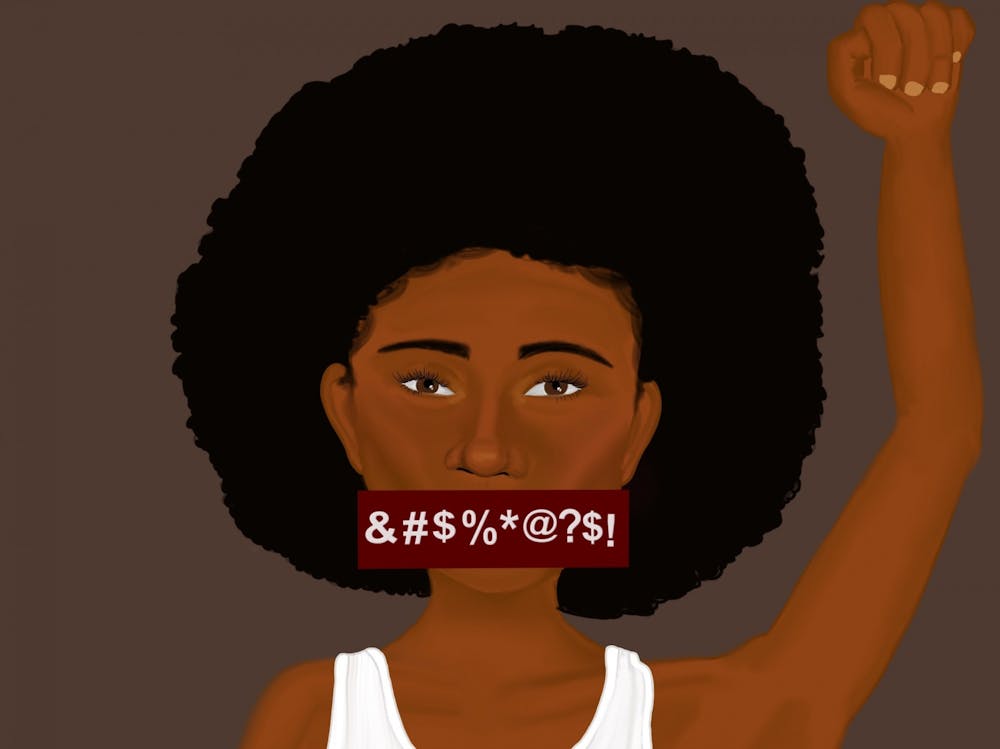By now, most of us have seen the video of Will Smith slapping Chris Rock across the face at the 94th Academy Awards. While scrolling through the seemingly innumerous reactions to this moment on social media, I came across a video of Rock allowing Louis C.K. and Ricky Gervais to say the n-word — hard r — repeatedly in the 2011 HBO special “Talking Funny.” They obviously felt comfortable because Rock encouraged them instead of challenging them. But the thing is — one Black person does not have the authority to deem something okay or not okay when it comes to racism. And white people who jump at the chance to participate in harmful behaviors genuinely scare me. Slurs are such a sensitive topic that I can’t even spell out the n-word fully for this column — though I would if this were any other circumstance. The n-word is a sacred and important part of Black culture.
It is vital to protect the things that make up our culture and keep our community together. I do not find it worth it to take things away from Black culture, especially when it does not cause harm to anyone else. Let’s not pick at Black culture. It has been picked at enough since the beginning of enslavement. Senior Associate Opinion Editor Shaleah Tolliver called for the termination of the n-word altogether in an opinion piece last month. I understand and empathize with her point of view, but I cannot agree. There is a tendency for both Black and non-Black people to set us up against standards that were not created for us in the first place. It is especially sad to see when they are the same standards created to undermine Black culture. I will say it a million times — the n-word is sacred. We do not need to conform to all of the rules set forth for other groups of people. It is unrealistic to expect all people to stop using the word altogether, as Tolliver herself points out.
There are many facets of Black culture that are sacred, and that comes from the wealth of common experiences we share and traditions that have been passed down through generations of Black families. There is no need for context or linked profiles in Black culture. Knowing Black-famous names such as Countess Vaughn, Mo’Nique, Lisa Bonet, Kirk Franklin, Nia Long and Morris Chestnut is a part of Black culture. Knowing the stark difference between season 3 and season 4 Aunt Viv is a part of Black culture. Growing up with Tyler Perry plays bootlegged on DVDs is a part of Black culture. Knowing that the auntie with a little extra fat around her elbows is going to throw down in the kitchen is a part of Black culture.
Waiting for our mommas and grand-mommas to finish talking for what feels like four hours after church is a part of Black culture. Being home before the streetlights come on is a part of Black culture. Setting fashion trends with long acrylics, bamboo hoops and nameplate necklaces is a part of Black culture. Knowing that saying you wish somebody would does not actually mean you wish somebody would is a part of Black culture. Giving the nod is a part of Black culture. Raising up our fists in solidarity is Black culture. Having to have the police talk with our children is a part of Black culture. Understanding the reasons why we can not act the same as our white peers is a part of Black culture. Greeting one another with the term that was used for generations to degrade us is a part of Black culture.
Tolliver’s column ultimately asks individuals to stop using the word altogether. Racist and ignorant people already know they aren’t supposed to use it, but do anyway — who does that leave to take Tolliver’s suggestion? The only people Tolliver’s column could affect are Black people. Black people would have the capacity to stop using the term because we do not use it to scorn those we hate — I do not believe racist people have that same ability. Therefore, while Black people would begin to stop saying the n-word, non-Black people would be the only ones left. So, I think Tolliver’s suggestion may cause more harm than good. I do not see the point in calling for something so unrealistic that has the potential to harm the Black community in the process. Moreover, who says that we need to fully reclaim the word? I do not think reclamation is the true intention. Reclamation is surely among the reasons why we use the word, but we are not only aiming to gain back something that has been taken from us — we are aiming to maintain the solidarity in our community. And solidarity is what keeps us bonded together.
Aliyah D. White is an Opinion Columnist for The Cavalier Daily. She can be reached at opinion@cavalierdaily.com.
The opinions expressed in this column are not necessarily those of The Cavalier Daily. Columns represent the views of the authors alone.







